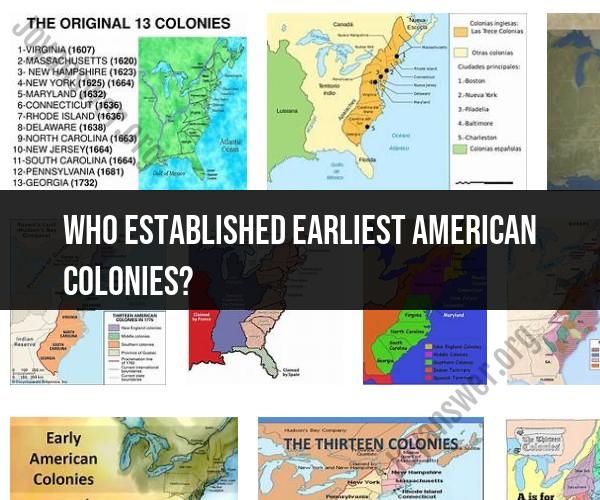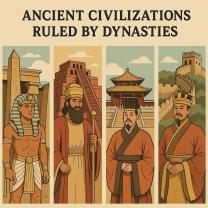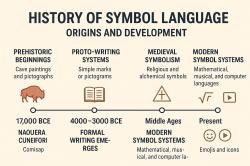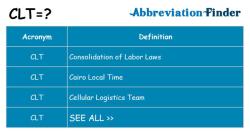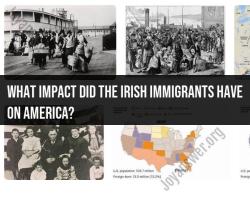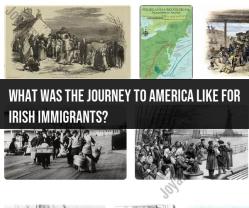Who established earliest American colonies?
The earliest American colonies were established by European powers during the Age of Exploration and Colonialism. The specific European countries and individuals involved in the establishment of these colonies varied depending on the region of the Americas. Here's a brief overview:
Spanish Colonies:
- Christopher Columbus, an Italian explorer sailing under the flag of Spain, is often credited with the discovery of the Americas in 1492. His voyages led to the establishment of Spanish colonies in the Caribbean, Central America, and parts of North and South America.
- Hernán Cortés and his conquistadors played a significant role in the conquest of the Aztec Empire in present-day Mexico in the early 16th century.
- Francisco Pizarro and his expedition conquered the Inca Empire in what is now Peru in the early 16th century.
- Spanish colonies continued to expand throughout the Americas, including areas like Florida, New Mexico, California, and the southwestern United States.
Portuguese Colonies:
- Portuguese explorer Pedro Álvares Cabral is credited with discovering Brazil in 1500. Portugal established colonies in Brazil and other parts of South America.
English Colonies:
- In 1607, the English established the first permanent English colony in North America, Jamestown, Virginia. This was largely an economic venture by the Virginia Company.
- The Pilgrims, seeking religious freedom, established the Plymouth Colony in 1620 in what is now Massachusetts.
- The Massachusetts Bay Colony was founded in 1630 by Puritans seeking religious freedom.
- Other English colonies followed along the eastern seaboard, including those in present-day New York, New Jersey, Maryland, and the Carolinas.
French Colonies:
- French explorers, such as Jacques Cartier and Samuel de Champlain, played a role in exploring and establishing colonies in what is now Canada (New France) in the early 17th century.
- The French also established colonies in the Mississippi River valley and the Great Lakes region.
Dutch Colonies:
- The Dutch established New Netherland, which included parts of present-day New York, New Jersey, Delaware, and Connecticut, in the early 17th century.
Swedish Colonies:
- The Swedes established a colony in Delaware in the early 17th century, known as New Sweden, before it was later taken over by the Dutch and then the English.
Russian Colonies:
- Russian explorers and fur traders established colonies in Alaska and parts of the Pacific Northwest in the 18th century.
Other European Powers:
- Other European countries, including Sweden, Denmark, and Scotland, also established colonies in various parts of North America during this period.
The establishment of these early American colonies had profound and lasting impacts on the indigenous peoples of the Americas and on the subsequent history and development of the United States, Canada, and Latin American nations. These colonies played a crucial role in shaping the cultural, political, and economic landscape of the Americas.
European Powers that Established Early American Colonies
The four European powers that established the early American colonies were:
- Spain
- France
- Dutch
- England
Motivations for Colonization of North America by Europeans
The Europeans had a number of motivations for colonizing North America, including:
- Economic opportunity: The Europeans were hoping to find new sources of wealth in North America, such as gold, silver, and furs.
- Religious freedom: Some Europeans were seeking religious freedom in North America. For example, the Puritans fled England to establish a colony in Massachusetts where they could practice their religion freely.
- Political power: Some Europeans were seeking political power in North America. For example, the English wanted to establish a new empire in North America.
Comparing Spanish, French, Dutch and English Colonies
The Spanish, French, Dutch, and English colonies in North America had a number of similarities and differences.
Similarities
- All of the colonies were established by European powers.
- All of the colonies were located in North America.
- All of the colonies were initially inhabited by Native Americans.
- All of the colonies experienced some degree of conflict between Europeans and Native Americans.
Differences
- The Spanish colonies were primarily established in the southern and southwestern regions of North America.
- The French colonies were primarily established in the central and eastern regions of North America.
- The Dutch colonies were primarily established in the northeastern region of North America.
- The English colonies were primarily established in the eastern region of North America.
- The Spanish colonies were primarily motivated by the desire to find gold and silver.
- The French colonies were primarily motivated by the desire to convert Native Americans to Christianity and to establish a fur trade.
- The Dutch colonies were primarily motivated by the desire to establish a trading empire.
- The English colonies were primarily motivated by the desire to establish religious freedom and to create a new society.
The Spanish, French, Dutch, and English colonies in North America had a profound impact on the development of the United States. The legacy of these colonies can still be seen today in the country's culture, government, and economy.
